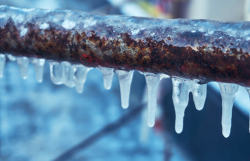Winter Water Tips
When water freezes, it expands about 9%. If the temperature of the water in your pipes drops below 32 degrees, even for a short period, you’re more likely to have a pipe fracture or worse. If you haven't already done so here are some simple measures you can take to help avoid the expense and inconvenience of frozen water pipes.
Close Crawl Spaces and Vents
Anywhere cold air blows on a pipe, it creates the potential for freezing. To make sure your pipes are protected from the cold close crawl space vents and stuff insulation over the openings. Even a tiny hole can let in a lot of cold air.
Protect Outside Pipes and Faucets
In some homes, the outside faucets and hose bibs have a separate shut-off valve. If this is the case at your home, make sure you turn off the valve to the outside water. Then, disconnect the garden hose and open the faucets to drain water from the pipe. Leave the faucets in the open position, wrap or cover all outside faucets and hose bibs to protect them from the freezing.
Winterize the Irrigation System
Water left in the pipes of your irrigation system can freeze over winter, causing costly damage to the entire system. You owe it to yourself to make an annual habit of winterizing your irrigation system when the summer watering season is over. This means removing the water from the pipes so there’s nothing to expand when temperatures dip down below freezing.
Open the Cupboard Doors Beneath Your Sinks
When it becomes very, very cold or if your home is not well insulated opening the cupboard doors beneath your sinks will allow warm air to circulate around the pipes and help keep them from freezing. If you’re anticipating a deep freeze, consider using a fan to help circulate the air near the pipes, or purchase a small space heater for some extra temporary heat.
Allow Water to Trickle From the Faucets
In extreme or long-term cold spells, allow the water to trickle from your inside faucets to prevent freezing. Over a 24-hour period this will cost less than 15 cents per faucet.
Never Turn Off the Heat When You Leave Home
During the winter set the temperature to at least 55-60 degrees F, and if you have multiple heat zones, be sure to adjust all thermostats appropriately.
Leaving for the winter?
If you plan to be gone for an extended amount of time this winter call your water provider and have them shut off and lock your water meter. This can prevent excessive water damage if a pipe burst while you are away.
Know Where the Water Shut Off to Your House is
In an emergency knowing where your homes main water shut off valve is can save you costly damage. These main valves are usually located in the garage, or in a crawlspace where the water line enters the house. Identify the valve by tying a colored piece if yarn or string to it and make sure everyone knows how the valve works.
Have Emergency Telephone Numbers Handy
Despite all best precautions water pipes may still freeze. Keep the number to your local water provider and your plumber posted in a location where everyone can see it in case of an emergency.
For more indoor/outdoor water conservation information and free tools and devices call the Clackamas River Water Providers at 503-732-3511 or visit clackamasproviders.org.

